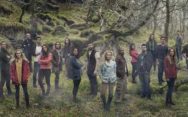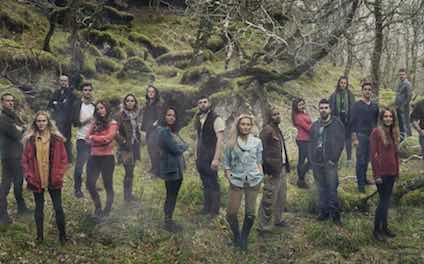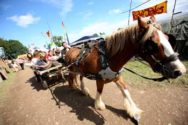
New TV series off-grid in Scotland
The series due to launch tonight on BBC Channel 4, will chronicle the successes and failures of a new social experiment in Ardnamurchan, near Lochaber, in Scotland’s wild western Highlands.
Using only natural resources to build shelter, hunt for food and cook.
Making up the rules of their new society as they go along, the 23 contestants in the rather unoriginally named “Eden” will spend a year getting to grips with the remote countryside and learning to live with each other. The series shows that the appetite for life in the wilderness — both experiencing it and watching it — remains strong, and really gets to grips with the idyllic notion of self-sufficiency.
the series bills itself as an antidote to the usual trivia you see in reality shows, but the early signs are not good – the press releases stress that the inmates got drunk and flirted with each other. And the idea that they would be cut off from their nearest neighbors makes it more of an unreality show.
In reality, trying to forge a community from scratch can be a lifetime’s work. There are, however, a number of alternative settlements in Scotland in place that eschew conventional ways of life in favour of an existence focused on the land, spirituality, or making a living from traditional crafts and techniques.
Experts say that many of these communities are finding favour with burnt-out city-dwellers looking for a break, a new business opportunity or a complete change of scene.
We look at some of Scotland’s most interesting rural villages and settlements where it is possible to buy — or acquire membership — into a different way of life.Findhorn Ecovillage, MorayConceived in the 1970s by the Findhorn Foundation, a community began to evolve on the north coast of Scotland. It includes an on-site theatre and concert hall. Governed by members of businesses within the eco-village, such as a publishing house and an arts centre, the settlement can be found to the south of Findhorn, on the Moray Firth.
Andrew Yeats , a partner at Eco Arc, has seen the settlement flourish. “When I was an architecture student it was my thesis to design the concept of a sustainable eco-village,” he says. “Initially I went to Findhorn for six months, and ended up staying for six years. I’ve been working on the eco-village ever since.
, a partner at Eco Arc, has seen the settlement flourish. “When I was an architecture student it was my thesis to design the concept of a sustainable eco-village,” he says. “Initially I went to Findhorn for six months, and ended up staying for six years. I’ve been working on the eco-village ever since.
“Originally, the community group bought a 35-acre caravan park and sought planning permission to change the use of the site to house permanent dwellings. The idea was to build a village that translated their ecological aspirations of being lighter on the Earth.
“The eco-village now has some of the most environmentally efficient buildings in Europe, with electricity produced from wind turbines and the ability to treat sewage. Residents grow a lot of their own food on site. They co-run a Rudolf Steiner school and a number of …
